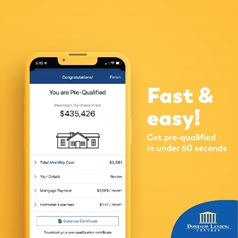Is A Five-Year Fixed Mortgage Right For Me?

When someone chooses a five year fixed mortgage term for their home financing, more often than not it is for one simple reason – security. A fixed interest rate provides the comfortability of knowing that your interest rate, and therefore your regular payment, will not change for the life of the mortgage term typically 5 years. For this simple reason, this is the default choice for many homeowners when shopping for a mortgage rate. But what if I told you that if you broke that fixed rate early you would be looking at a drastic penalty that will equate to around 4.5% of your mortgage balance? This would maybe make you wonder if there was another option that provided a stronger protection against the changes of life.
As an expert in the field, I want to help you understand what a five-year fixed-rate mortgage is, its benefits, and whether this type of interest rate is right for you. Today’s blog will give you an overview of the pro’s and con’s of this popular product
Benefits of a five-year fixed mortgage
1. The interest rate remains constant
The main benefit of five-year fixed rate deals is the security that comes with a set-in-stone interest rate, allowing you to budget and know exactly how much interest you’ll pay over the five years. Knowing how much your mortgage is going to cost you for a set period of time can offer both security and peace of mind.
2. Payments will never change during the term
Because the interest rate never changes, your payment doesn’t either. In rate markets where there are anticipated future increases to interest rates, this can be provide an opportunity to lock-in your savings for the next five years. If you are choosing this type of interest rate specifically for the locked-in payment, it’s imperative to know that there are variable rate options that can provide this same benefit but without the penalty risk mentioned at the beginning of this article.
3. You will typically get a better rate compared to a three or four year fixed term
A shorter initial fixed period gives you more flexibility to make changes down the line by reducing the penalty cost of breaking your mortgage term early but depending on the state of the economy can come at the cost of a higher rate compared to the five year term. However, as I write this article today’s rate market is an exception to this rule. With rates being historically low for over a year now, there is an anticipation for fixed rates to rise over the next few years, so banks are offering bigger discounts to take the 3 or 4 year fixed rate with the hope they will be able to renew you into a higher rate quicker once that earlier term becomes due. So there are definitely exceptions to this rule.
Common problems faced when first starting with a five-year fixed-rate mortgage
When clients get their first mortgage to purchase their first home, that home is typically an entry-level property like an apartment or townhouse. After this initial first purchase, many Canadians will look to upgrade to a bigger home within the first three years of their mortgage term. If you have a five-year fixed rate, this can trigger a large penalty - equal to around 4.5% of your current balance - if you are looking to pay off your mortgage early. Even if this is not your first home and you plan to reside in it for the next five years, it is vital to know that over 60% of homeowners break their five-year fixed mortgage term within thirty-six months for various situations such as getting a lower interest rate, pulling equity for renovations, etc. This, too, can trigger a large penalty in order to make these changes. To avoid facing a large penalty, you need to ensure you are making the right decision by taking on a five-year fixed-rate mortgage by reviewing all the options with your mortgage broker.
When should you choose a five-year fixed mortgage?
To determine if this product is right for you, you need to understand its purpose for you and your timeline for the next five years. Consider what you want in the course of the next five years and determine whether a fixed rate hampers that or fits in perfectly. For this, you’ll have to ask questions like:
a. “What are my/our plans for the next five years?”
As we mentioned above, over 60% of homeowners with a five-year fixed mortgage will break their term early. So this means based on this statistic, you are more likely to be stuck paying a penalty than not. To avoid being another statistic, it is in your best interest to consider what your plans are in real estate for the next half a decade. Do you have plans to upgrade your existing home? Do you plan to move in the coming years? What about starting a family? Purchasing a new vehicle and want to use your mortgage to pay for it? Better yet, is an investment or vacation property in mind? If you said yes to any of these sample questions, then you will really want to consider whether a five-year fixed is right for you by discussing these plans with your mortgage broker. If after discussing you determine it is still for you, you’ll want to ask these follow-up questions about your mortgage:
b. Does your fixed mortgage rate include a portability clause?
A portable mortgage is a mortgage that permits the mortgage borrower to transfer their mortgage balance to a new property without penalties. This means that if you have locked into a low rate, but then you have the need or the desire to purchase another home, the low-interest rate is retained and the penalty is avoided.
c. How is the penalty for the mortgage calculated if you decide to pay it off early?
It may not seem fair or transparent, but the penalty charged to you when you go to pay off your mortgage early can vary depending on how that bank decides to calculate their “interest-rate differential” penalty. For example, the big banks we all recognize – like RBC or CIBC to name a few – will have the highest calculation of this penalty. This is because they get away with basing the calculation off a “posted rate” which is a hypothetical rate they use to increase the cost of leaving them early. Whereas the smaller but just as competitive “Monoline” banks like RMG, MCAP or First National Bank will have a drastically smaller penalty as they do not use a posted rate and instead use a more realistic rate comparison to calculate your penalty. Often times when clients decide on a five-year fixed rate I will encourage them to consider sending their mortgage to one of these monoline banks to help protect them from an expensive penalty fee down the road.
d. Does your bank/lender offer any rebate of penalty if you return as a client?
Sometimes banks will offer some form of reduction on your mortgage penalty if you come back to them for the new mortgage. Often times only 10% of the penalty is reduced, but it can be more depending on your relationship with them. This is most often confirmed on an exception basis, so it will be difficult to confirm how much they would be willing to reduce it by before you’ve already got the mortgage and are making payments. If you are employed by the military some banks will waive the entire penalty if you are relocated for work purposes.
Alternatives to a five-year fixed-rate mortgage
Before you decide on a fixed mortgage product, it is vital to do an assessment of what you have planned for the next five years. Think about whether you expect to make any major changes to your home financing within the five years. Changes such as getting a moving, pulling out equity for renovations, etc.
In situations where you are purchasing your first place and cannot confirm your long-term finances, or are simply unsure about what the next five years will look like for you, you may want to consider a five-year variable mortgage. Currently, this will not just provide you with a much lower interest rate compared to the fixed, but most importantly, it will grant you a much more reasonable penalty of only three-months interest. You can also get a variable mortgage that has a fixed payment so you don’t need to worry about fluctuating payments. Lastly, you can also consider taking a one to four-year fixed term to mitigate the penalty costs associated with a fixed-term mortgage.
If you are looking for a mortgage broker In Victoria, BC, then reach out to us for a complimentary assessment of your situation. As a mortgage broker and credit specialist for Canada’s largest national mortgage brokerage, Dominion Lending Centres, I am an expert in assisting clients to create and implement long-term strategies to assist them in achieving their real estate goals. With access to a vast network of major banks, credit unions, trust companies, and alternative lending options, I can ensure the correct solution for your unique situation. I offer services like first-time home buyer mortgage, mortgage renewal, mortgage refinancing, reverse mortgage, private mortgage lending, self-employed mortgage, investment property mortgage, new to canada mortgage, etc. My services are available across Comox, Vancouver, Campbell River, Victoria, Mill Bay, Cobble Hill, Duncan, and Nanaimo, British Columbia. To learn more about how I can help you, please click here. If you have any questions about mortgages, please get in touch with me here.

